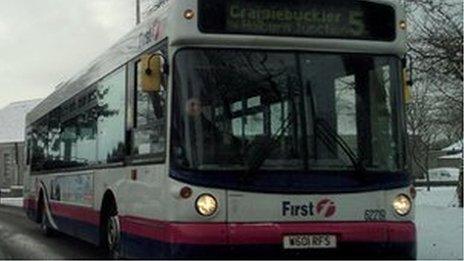Vince Cable warns businesses on 'ridiculous' pay awards
- Published
Business Secretary Vince Cable talks to BBC Business Editor Kamal Ahmed about his warning to FTSE 100 companies on executive pay
Britain's top companies have been warned to exercise caution on executive pay by Business Secretary Vince Cable.
As firms prepare for their annual general meetings, Mr Cable has written to all FTSE 100 members to remind them that pressure on pay awards must be kept up to assuage public anger.
He said pay levels at banks in particular had been "ridiculous".
He singled out Barclays, which has its shareholder meeting scheduled for Thursday.
The bank came under fire earlier this year when it allocated about £2.5bn in bonus pay, despite a dip in profits.
Last year, Mr Cable introduced rules forcing listed firms to give shareholders a binding vote on directors' pay to make a "clearer link between pay and performance".
'Trust lost'
The move followed investor anger over rising boardroom salaries at a time of falling share prices and sluggish earnings.
"A lot of trust has been lost, because of the extremes of what happened in 2010, when pay escalated massively unrelated to the performance of companies," Mr Cable said in an exclusive BBC interview.

Mr Cable warned excessive pay for top executives has alienated the public
"This is an opportunity for these companies to make peace with the public.
"It's particularly true of the banking sector where pay reached ridiculous and dangerous levels, and with Barclays in particular coming up on Thursday, we will see how far they have listened to people who own the banks - the shareholders - and exercise responsibility in long term thinking."
Annual general meetings are an opportunity for shareholders to ask questions of a company's board and to vote on board members' election and executive pay, among other things.
Shareholder Spring
"In the last year we have seen striking examples of shareholders rising up to protest against pay that neither reflects past performance nor is well calibrated to encourage a decent performance going forwards," Mr Cable writes in the letter to company bosses.
"You will be conscious that this issue continues to be the focus of considerable public debate. Unless business is seen to act responsibly, pressure for further action will inevitably result."
Mr Cable's push for more moderate salaries follows the so-called "shareholder spring" of 2012, which led to the resignation of Trinity Mirror chief executive Sly Bailey and Aviva boss Andrew Moss.
The letter on pay follows a series of corporate reforms announced by Mr Cable in recent days, including a public register in which companies will have to list their true owners, and a crackdown on "rogue directors".
- Published17 July 2013

- Published10 March 2014